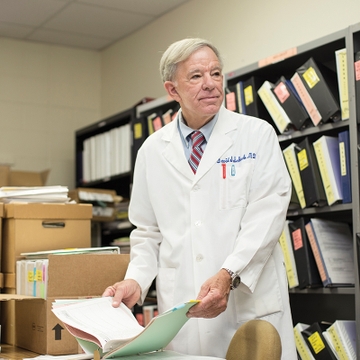When David Schade, MD, delivers the Eighth Annual Community Engaged Research Lecture (CERL) at The University of New Mexico on April 19, he’ll have 50 minutes to expound on his favorite subject: saving lives.
“The talk will really be about preventing heart disease in everybody, and particularly in diabetic patients,” said Schade, an endocrinologist and professor in the Department of Internal Medicine.
The CERL is one of the highest honors that UNM bestow upon a faculty member in recognition of exemplary community engaged research or community engaged creative works. The awardee receives a $5,000 honorarium or a funding allocation to be placed in a research-related account, and the awardee’s name will be included in the UNM Roll of Honor.

The most important reason that I appreciate this award is that it gives me an opportunity to talk to many people that I normally never talk to and tell them that there’s no reason to die of a heart attack
“The most important reason that I appreciate this award is that it gives me an opportunity to talk to many people that I normally never talk to and tell them that there’s no reason to die of a heart attack,” Schade said. “I can theoretically save a few lives by getting people to understand that they can do something about it.”
Schade, who serves as chief of the Division of Endocrinology & Metabolism, has been at UNM since the 1970s and has been the principal investigator on multiple large multicenter clinical studies involving diabetes and cardiovascular research. He has nearly 700 peer-reviewed publications.
In recent years, he has focused on the direct connection between diabetes and heart disease.
“The problem with diabetes is not everybody is in good glucose control,” Schade says. In those cases, elevated blood sugar damages the nerves, kidneys and lining of the blood vessels – including those supplying the heart. “The talk will really be about preventing heart disease in everybody, and particularly in diabetic patients,” he says.
Schade cited four major risk factors for heart disease: diabetes, smoking, hypertension and high cholesterol. “Some diabetic patients have all four, and of course they die at an early age,” he says. Meanwhile, the societal costs of heart disease are staggering, claiming nearly 600,000 lives in the U.S. every year.
“If you have a heart attack and you pay for all the nurses and all the doctors and all the medications and then you follow the patient, it’s $100,000,” he says. “In New Mexico, there are 6,000 calls to the emergency med service every month for chest pain.”
With emeritus professor R. Philip Eaton, MD, Schade helped persuade the New Mexico Legislature in 2021 to mandate that health insurance plans cover the cost of coronary artery calcium scans, which cost about $150.
The non-invasive CT scan accurately predicts a person’s risk of suffering a heart attack by identifying the presence of calcium-containing plaques in the inner lining of the blood vessels.
“We’ve sent a letter to Washington to try to get Medicare to cover the cost of a calcium scan,” Schade says. “Medicare doesn’t cover it, even though Medicaid does.”
Should a coronary artery calcium scan detect evidence of silent heart disease, lifestyle changes coupled with medication therapy can actually reverse the damage in the arteries, he says. “I’m trying to get the message out that you can do something to prevent it.”
Schade is hoping for a big audience with whom to share his message of health empowerment.
“This is a talk for everybody – and everybody will enjoy it,” Schade says. “It will mean something to everybody, because everybody has a heart.”
